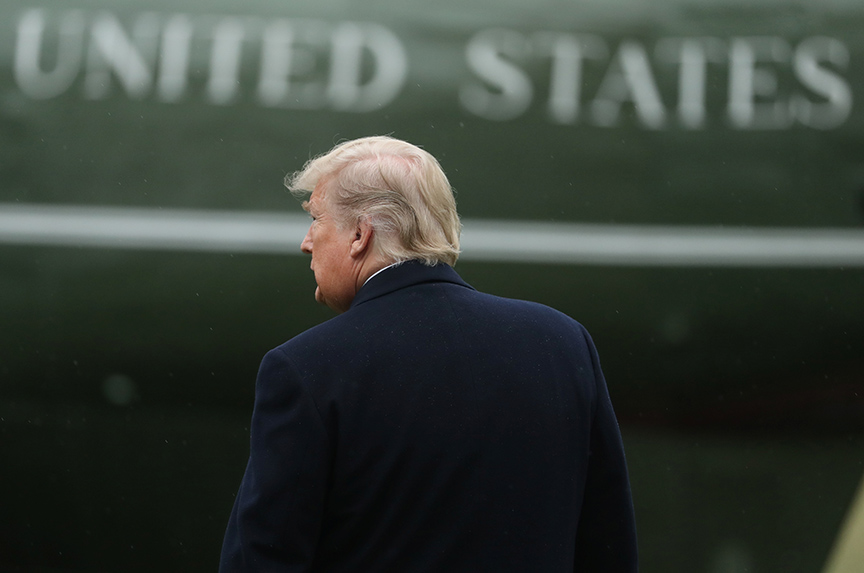January 20 marks two years since US President Donald J. Trump took office. We take a look back at some of the big foreign policy headlines made by the president and his administration over these past two years.
January 20, 2017
Inauguration: Donald J. Trump is inaugurated the 45th president of the United States in Washington.
January 23, 2017
Trump Quits TPP: On his first full working day as president, Trump withdraws the United States from the Trans-Pacific Partnership (TPP) trade agreement. Besides the United States, the TPP includes Canada, Mexico, Peru, Chile, Japan, Vietnam, Brunei, Malaysia, Singapore, Australia, and New Zealand. Trump described TPP—a signature agreement of his predecessor Barack Obama’s presidency—as “a potential disaster for our country.”
“Donald Trump is enabling [Chinese President] Xi Jinping to make China great again,” said Robert A. Manning, a senior fellow with the Atlantic Council’s Scowcroft Center for Strategy and Security.
“We are now letting China define the rules and are going to regret that for a long time,” he contended.
In a similar vein, Jason Marczak, currently director of the Atlantic Council’s Adrienne Arsht Latin America Center, said: “With the United States looking more inward in the years ahead, this is a huge moment for China’s global ascent.”
January 27, 2017
The Travel Ban: Trump signs an executive order that prevents refugees from around the world and citizens from seven Muslim-majority countries from entering the United States.
“The ban not only provides fuel for the radicals, but it also undermines American diplomacy, American business, and the ability of our military to operate abroad,” Lawrence Pintak, a nonresident senior fellow in the Atlantic Council’s Rafik Hariri Center for the Middle East, told us.
“Trump just handed [the Islamic State of Iraq and al-Sham] a gift,” he added.
April 13, 2017
Syria Airstrikes: The United States is joined by France and the United Kingdom in conducting airstrikes on Syria in response to a chemical weapons attack blamed on Bashar al-Assad’s regime. The Pentagon announced that fifty-nine Tomahawk Cruise missiles had struck Al Shayrat air base.
“We are prepared to sustain this response until the Syrian regime stops its use of prohibited chemical agents,” Trump said.
Frederic C. Hof, at the time director of the Atlantic Council’s Rafik Hariri Center for the Middle East, said the missile strikes should not be a one-off event. “If this is a one-off event, fire-and-forget retaliation against a single incident, it will prove useless; it will prove ineffective and history will record it as such,” he said.
May 18, 2017
No to NAFTA: US Trade Representative Robert Lighthizer notifies Congress that Trump intends to renegotiate the North American Free Trade Agreement (NAFTA). “For years, politicians have called for the renegotiation of this agreement, but President Trump is the first to follow through with that promise,” said Lighthizer.
May 20-27, 2017
Trump Goes Abroad: This is Trump’s first trip abroad as president. His itinerary includes stops in Saudi Arabia, Israel, the West Bank, Italy, Vatican City, Belgium, and Italy.
June 1, 2017
Trump Quits Paris Accord: Trump announces his decision to pull the United States out of the Paris climate agreement. He says his administration will “begin negotiations to re-enter either the Paris accord or an entirely new transaction on terms that are fair to the United States… We’re getting out, but we will start to see if we can make a deal that’s fair.”
Richard L. Morningstar, founding director of the Atlantic Council’s Global Energy Center, told us: “The president’s decision to withdraw from Paris is a huge mistake. There is no upside.”
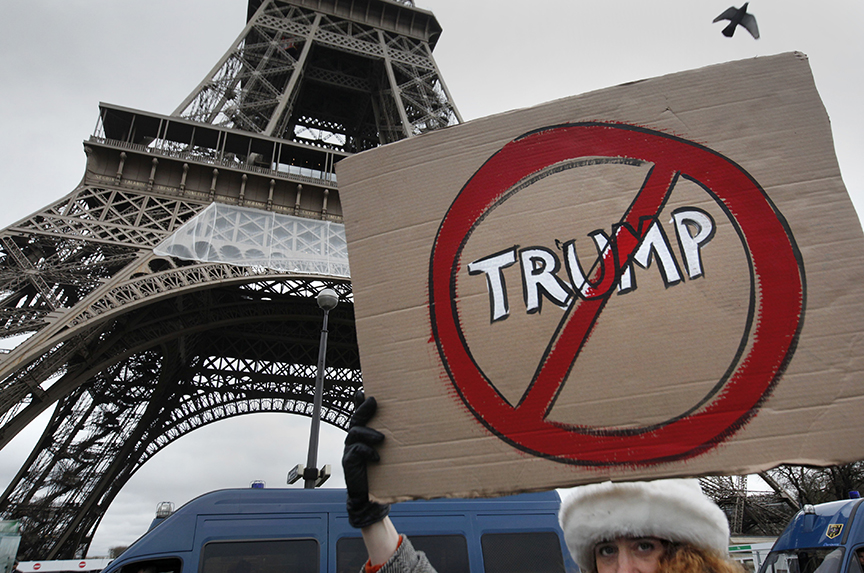
Protesters rallied near the Eiffel Tower in Paris on February 4. US President Donald J. Trump announced on June 1 that the United States will withdraw from a historic Paris climate agreement that is intended to curb the harmful effects of global warming. (Reuters/Mal Langsdon)
July 6, 2017
Trump Affirms Article 5: After surprising his closest advisers by failing to explicitly commit to Article 5 at a meeting of Alliance leaders in Brussels in May, Trump affirms US commitment to NATO’s collective defense article.
“To those who would criticize our tough stance, I would point out that the United States has demonstrated not merely with words but with its actions that we stand firmly behind Article 5, the mutual defense commitment,” Trump says in a speech in Poland.
A month earlier, on June 5, addressing the Atlantic Council’s Distinguished Leadership Awards dinner in Washington, US Vice President Mike Pence affirms the United States’ commitment to NATO and Article 5.
July 14, 2017
What a Parade! French President Emmanuel Macron hosts Trump at the Bastille Day Parade in Paris. Trump is so impressed by the pomp and grandeur he wants a military parade of his own in Washington.
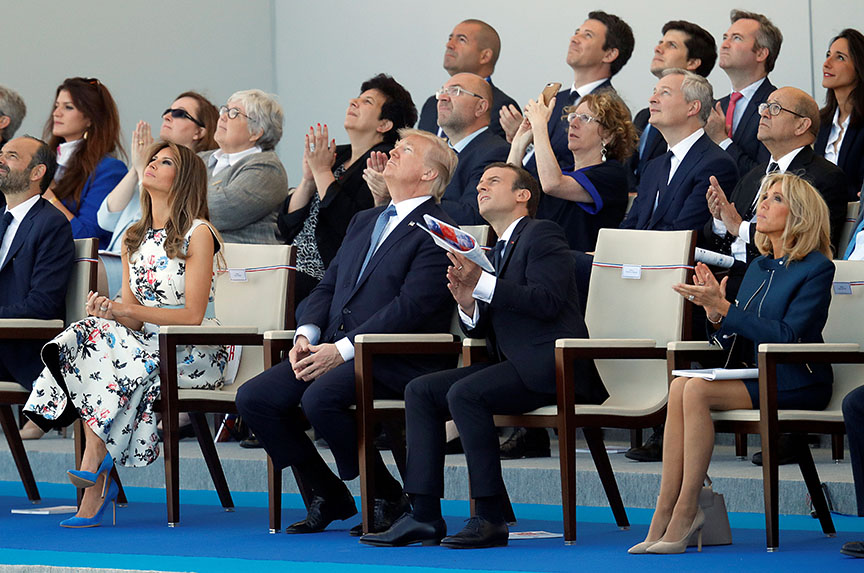
US President Donald Trump and French President Emmanuel Macron attended the Bastille Day military parade in Paris with their wives, First Lady Melania Trump (left) and Brigitte Macron (right), on July 14, 2017. Trump was reportedly so impressed by the display that he asked the Pentagon to host a military parade in Washington. (Reuters/Yves Herman)
August 8, 2017
Fire and Fury: Trump ratchets up his war of words with North Korean leader Kim Jong-un. “North Korea best not make any more threats to the United States,” Trump tells reporters in Bedminster, New Jersey. “They will be met with fire and the fury like the world has never seen.”
In the following months, Trump refers to Kim as “Little Rocket Man.”
August 21, 2017
Afghan Strategy: Trump outlines a new strategy for Afghanistan. He said Washington could “no longer be silent about Pakistan’s safe havens for terrorist organizations.”
“We have been paying Pakistan billions and billions of dollars at the same time they are housing the very terrorists that we are fighting… that will have
to change,” Trump added.
James B. Cunningham, a nonresident senior fellow in the Atlantic Council’s South Asia Center and a former US ambassador to Afghanistan, said: “This is the first time that it is clear that the United States and its international partners are in this for the long term, and that we are going to make our future decisions based on events that are happening on the ground and in the region and not against a timeline.”
However, Shuja Nawaz, a distinguished fellow at the Atlantic Council’s South Asia Center, wrote: “Long on assertions, but short on specifics, Trump’s speech failed to lay out a clear roadmap to ‘victory’ that is based on history and regional ground realities.”
September 19, 2017
UN Debut: In his first address to the United General Assembly in New York, Trump threatens to “totally destroy” North Korea if the United States is “forced to defend itself or its allies.”
October 13, 2017
The Iran Deal in Limbo: Trump says he will not recertify Iran’s compliance with the 2015 nuclear deal, formally known as the Joint Comprehensive Plan of Action to Congress (JCPOA). He claims Iran’s behavior violates the spirit of the nuclear agreement and he puts the onus on Congress to discuss reimposing sanctions on the Islamic Republic.
“Despite the threats, US withdrawal from the JCPOA absent a serious Iranian breach would turn our closest allies against the United States and undermine any leverage sought through renewed nuclear sanctions,” Brian O’Toole, a nonresident senior fellow in the Atlantic Council’s Global Business and Economics Program, told us.
November 8, 2017
Cuba Policy Rollback: The Trump administration rolls back some of the Obama administration’s rapprochement with Cuba. This includes reinstating travel and trade restrictions. Trump announced the decision in June. In September, the Trump administration cut US Embassy staff in Havana by half.
Responding to a comment by US Secretary of State Rex Tillerson that the rapprochement had not produced a positive change in the Castro government’s behavior, Jason Marczak said: “The US rapprochement is not about trying to extract concessions from the Castro government. It is about trying to empower the Cuban people and the Cuban private sector to have a greater voice.”
December 6, 2017
Recognition for Jerusalem: Trump announces his decision to recognize Jerusalem as the capital of Israel and to shift the US Embassy from Tel Aviv to Jerusalem. This marks a break with decades of US policy. In 1995, the US Congress mandated that the US Embassy be located in Jerusalem. For more than two decades, US presidents—Republicans as well as Democrats—have signed a waiver every six months that allows them to delay moving the embassy from Tel Aviv to Jerusalem on national security grounds.
“It has made it more difficult for the United States to play the role that it has traditionally played in the Middle East regarding Israel,” James B. Cunningham, who served as the US ambassador to Israel from 2008 to 2011, said of Trump’s decision.
Although Trump recognized Jerusalem as Israel’s capital, he didn’t describe it as the undivided capital of Israel. In fact, the president and White House officials made it clear that recognition of Jerusalem did not represent a shift in US policy on the future borders of Jerusalem. This is important because both Israelis and Palestinians lay claim to Jerusalem and Trump’s position leaves the door open to the fate of the city being determined in future peace negotiations.
On May 14, the US Embassy opens in Jerusalem.
March 1, 2018
Tariff Time: On March 1, Trump announces tariffs of 25 percent on steel imports and 10 percent on aluminum imports. Restrictions are imposed on China, but some exemptions are granted, including to Canada, Mexico, and the European Union with whom the United States is in trade negotiations.
On May 31, the Trump administration announces that it will no longer exempt Canada, Mexico, and the European Union from the tariffs. He cites national security concerns to justify the tariffs.
“The link to domestic security concerns is tenuous at best as the sanctions target key US allies,” Bart Oosterveld, director of the Atlantic Council’s Global Business and Economics Program, told us.
Marie Kasperek, associate director at the Global Business and Economics Program, said: “The United States is abusing the rules-based system it once built to target the very same allies with which it built this system.”
March 13, 2018
Tillerson Fired: Trump fires US Secretary of State Rex Tillerson who has spent a little more than a year on the job. In a tweet, Trump announces he was nominating Central Intelligence Agency Director Mike Pompeo as Tillerson’s replacement.
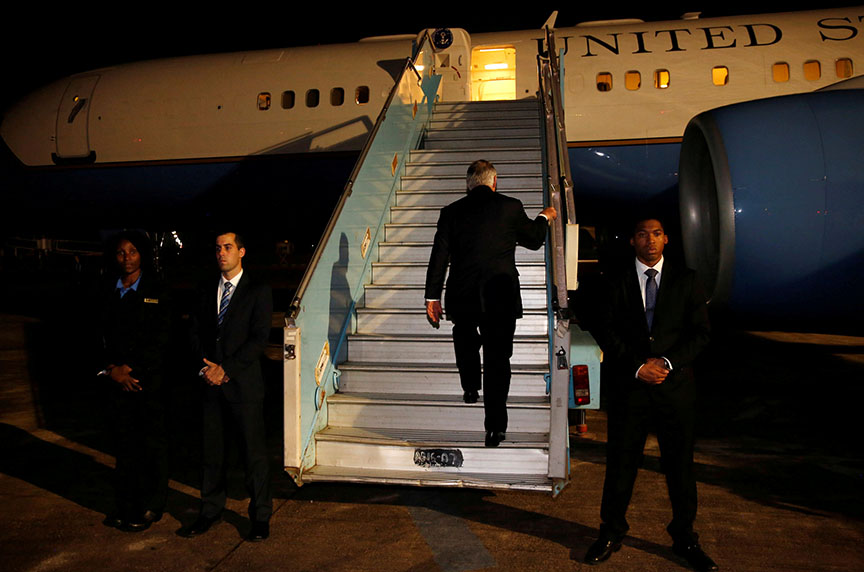
US Secretary of State Rex Tillerson boarded his plane to depart at the end of a five-country swing through Africa from Abuja, Nigeria, on March 12. On March 13, US President Donald J. Trump tweeted that he had fired Tillerson. (Reuters/Jonathan Ernst)
“Secretary Tillerson’s closed management style made him an ill-fitted secretary. Agreeing to massive budget cuts damaged his organization and therefore the United States, to little good purpose. But Secretary Tillerson’s policy judgments seemed consistent and sound,” said Daniel Fried, a distinguished senior fellow in the Atlantic Council’s Future Europe Initiative and Eurasia Center who served for forty years in the Foreign Service until his retirement in early 2017.
March 22, 2018
McMaster Out, Bolton In: Once again, in a tweet, Trump announces his decision to replace National Security Advisor LTG H.R. McMaster and appoint John Bolton to the job.
“As with the change from Secretary of State Rex Tillerson to Michael Pompeo, President Trump made this move to bring on a more like-minded adviser,” Barry Pavel, senior vice president, Arnold Kanter chair, and director of the Atlantic Council’s Scowcroft Center for Strategy and Security, told us. “This means the constraints keeping US foreign policy toward the mainstream are now greatly loosened. Buckle up: US foreign and national security policy are about to get far more assertive.”
Speaking at the Atlantic Council on April 3, McMaster says the West has “failed to impose sufficient costs” on Russia for its aggressive behavior that has ranged from cyberattacks to near-fatal poisonings.
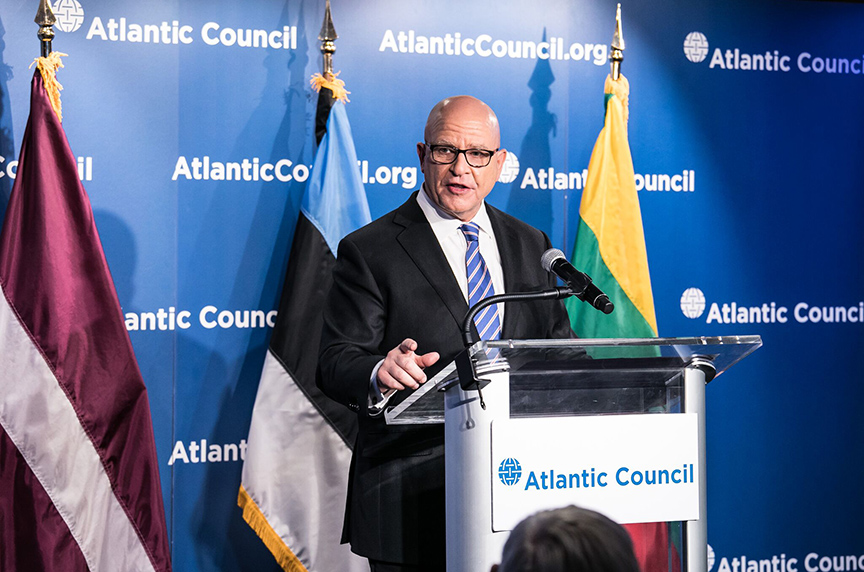
“Russian aggression is strengthening our resolve and our confidence. We might all help Mr. Putin understand his grave error,” US National Security Advisor LTG H.R. McMaster said at the Atlantic Council on April 3, referring to Russian President Vladimir Putin. (ImageLinkPhoto.com)
April 1-December 1, 2018
US-China Trade War: On April 1, China announces that it is imposing tariffs on US products worth around $3 billion in response to US tariffs on steel and aluminum. The following months are marked by tit-for-tat tariffs.
Who wins?
“Short answer: No one wins,” writes Marie Kasperek.
April 13, 2018
Syria Strikes: Almost a year since he first ordered airstrikes on Syria, Trump again orders the US military to strike sites in Syria that are thought to be linked to the regime’s chemical weapons program. Once again, the strikes are carried out in coordination with forces from France and the United Kingdom.
Speaking on the eve of the strikes, Frederic C. Hof said: “The most important thing here is what’s next. Critically, this is what was missing almost exactly one year ago.”
May 8, 2018
Trump Exits Iran Deal: Trump announces his decision to withdraw the United States from the JCPOA. He also signs a memorandum to reimpose sanctions on Iran.
“The fact is this was a horrible one-sided deal that should have never ever been made. It didn’t bring calm, it didn’t bring peace, and it never will,” Trump says at the White House.
“This is not one of the Trump administration’s better decisions,” said Barry Pavel.
However, Matthew Kroenig, deputy director of the Scowcroft Center for Strategy and Security, told us: “The Iran nuclear deal undermined many US interests and placed Iran on a patient pathway to the bomb. Trump’s bold decision to end the deal today should be followed up by a comprehensive strategy, drawing on all elements of national power and cooperation with allies and partners, to eliminate, not just delay, Iran’s nuclear weapons program.”
June 12, 2018
The Singapore Summit: Trump meets North Korean leader Kim Jong-un in Singapore. This is the first time that a sitting US president has met the leader of North Korea.
While maintaining that the summit in and of itself was not a bad idea, Daniel Fried wrote: “Adding a unilateral concession—suspending US-South Korean exercises without even consulting with our allies—smacks of careless frivolity. Tactical unpredictability can be a tool. Strategic unreliability is a liability.”
“China and Kim are winners,” Fried wrote, while Japan, South Korea, and US interests in Northeast Asia were the losers.
The summit was a “diplomatic win for the United States,” said Michael Morell, an Atlantic Council board member and former acting director of the Central Intelligence Agency. “Whether it turns out to be a strategic win depends on what happens going forward,” he added.
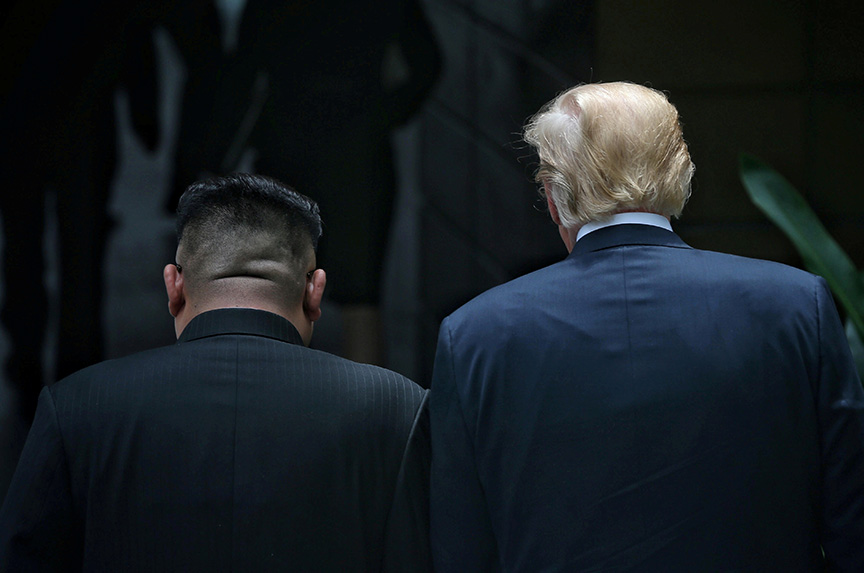
“I think we will have a terrific relationship,” US President Donald J. Trump (right) told North Korean leader Kim Jong-un when they met at the Capella Hotel on Sentosa island in Singapore on June 12. (Kevin Lim/The Straits Times via Reuters)
July 16, 2018
The Helsinki Summit: Following his meeting with Vladimir Putin, Trump appears to believe the Russian president’s denials over the US intelligence community’s assessment that Russia meddled in the 2016 elections. Trump says he saw “no reason why” Moscow would have acted in that way.
Dan Coats, the director of national intelligence, told a conference co-hosted by the Atlantic Council in Normandy, France, on June 8 that Russia was also attempting to influence the US midterm elections in November while simultaneously seeking to divide the transatlantic alliance.
“The big news, of course, is the president’s unbelievable siding with Putin against the US intelligence community on election interference. It will raise questions about whether some of the members of the intelligence community that Trump has appointed will be able to do their job if he doesn’t pay heed to the conclusions of their investigations,” Alexander “Sandy” Vershbow, a distinguished fellow in the Atlantic Council’s Scowcroft Center for Strategy and Security and a former US ambassador to Russia, told us.
R. Nicholas Burns, an Atlantic Council board member who served as US undersecretary of state from 2005 to 2008, noted: “The president did himself a lot of damage today internationally.”
Trump and Putin met for two hours behind closed doors with only two interpreters in attendance.
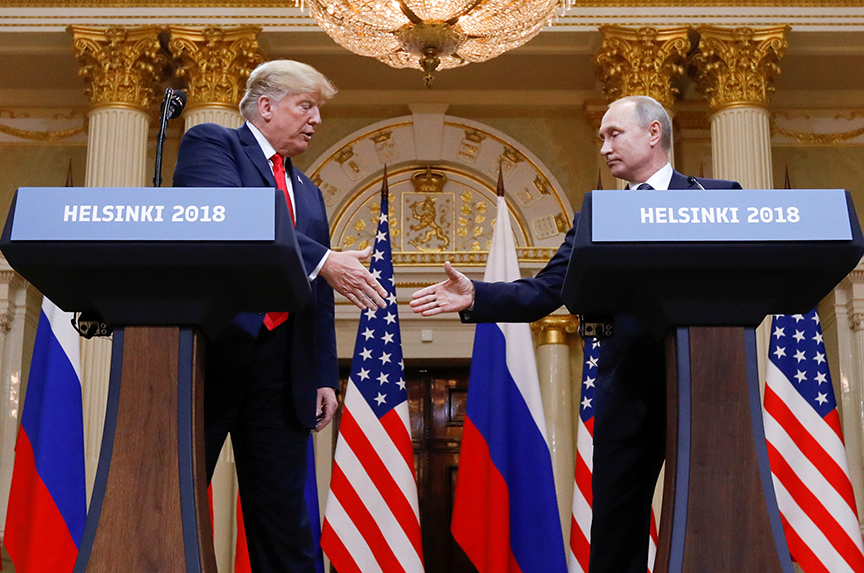
US President Donald J. Trump and Russian President Vladimir Putin shook hands during a joint news conference after their meeting in Helsinki, Finland, on July 16. (Reuters/Kevin Lamarque)
July 11 and 12, 2018
NATO Summit: The summit in Brussels was dominated by dramatic debates over burden sharing and uncertainty about the United States’ continued commitment to the Alliance. Ahead of the summit, Trump sent sharply worded letters to the leaders of some countries stating that Americans were tired of funding Europe’s defense and urging greater burden sharing.
“[It is] increasingly difficult to justify to American citizens why some countries do not share NATO’s collective security,” the president wrote.
Earlier, Trump threatened to withdraw the United States from NATO if the allies did not up their defense spending.
Addressing the NATO Engages summit co-hosted by the Atlantic Council in Brussels on July 11, NATO Secretary General Jens Stoltenberg says Trump’s “clear message” has resulted in allies upping their defense spending.
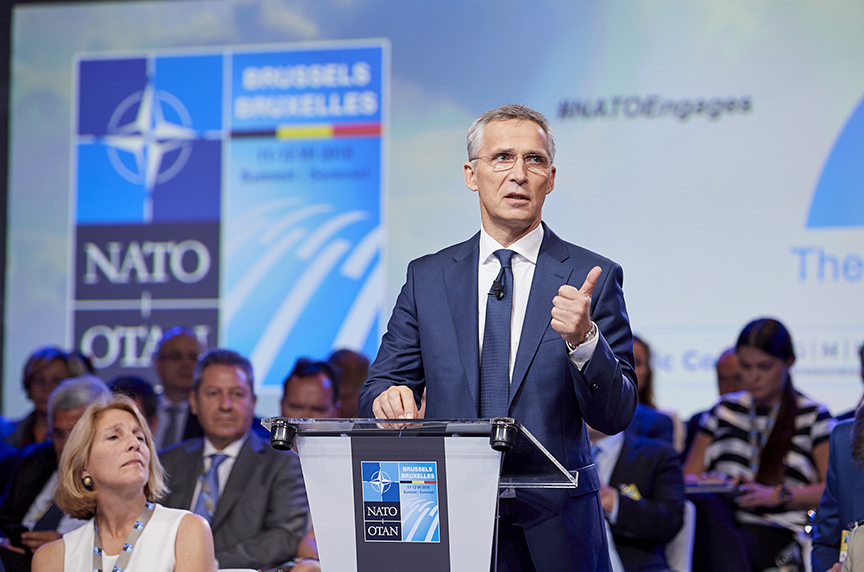
NATO Secretary-General Jens Stoltenberg speaks on July 11 at NATO Engages: The Brussels Summit Dialogue, a two-day event jointly hosted by the Atlantic Council, the German Marshall Fund of the United States (GMF), the Munich Security Conference (MSC), and Women in International Security (WIIS).
July 31, 2018
Tensions with Turkey: The US-Turkey relationship comes under strain as the US Treasury Department slaps sanctions on Turkey’s Minister of Justice Abdulhamit Gül and the Minister of Interior Süleyman Soylu over the imprisonment of an American pastor, Andrew Brunson.
Brunson is eventually released and returned to the United States in October.
September 25, 2018
Trump Puts America First: Trump uses his second address to the UN General Assembly to reaffirm his commitment to an America First approach to foreign policy. “We reject the ideology of globalism, and we embrace the doctrine of patriotism,” Trump tells the gathering of world leaders.
Daniel Fried said: “How can the United States contend with aggressive great powers (like Russia and China) if we share their worldview?”
“Trump’s rejection of ‘globalism’ and praise for ‘patriotism’ and national sovereignty masked the reality of the Trump administration’s growing estrangement from its traditional partners. The laughter that greeted some of his boastful claims only dramatized US isolation,” Alexander Vershbow told us.
October 9, 2018
Haley Resigns: US Ambassador to the United Nations Nikki Haley’s resignation catches many, including some within Trump’s Cabinet, by surprise. Speaking at the White House alongside Trump, Haley said she will leave the post at the end of the year.
On the implications of her decision, Daniel Fried said: “Much depends on her next moves.”
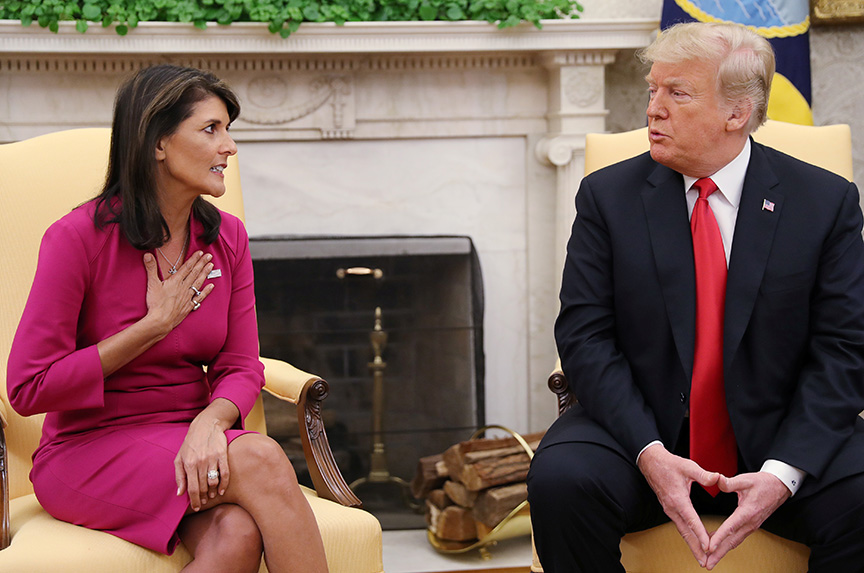
US President Donald J. Trump on October 9 said outgoing US Ambassador to the United Nations Nikki Haley has done “a terrific job.” They met in the Oval Office of the White House in Washington after the president accepted Haley’s resignation. (Reuters/Jonathan Ernst)
October 2, 2018 to present
Khashoggi Murder: Saudi dissident and Washington Post columnist Jamal Khashoggi’s murder inside the Saudi Consulate in Istanbul on October 2 puts the US-Saudi alliance under pressure amid accusations linking Saudi Crown Prince Mohammed bin Salman to the incident.
“Conventional wisdom not long ago was that Crown Prince Mohammed bin Salman would rise to the throne and serve for decades, helping to transform his country, the region and the future of Islam for the better. Though he may still achieve that, his success in doing so now rests heavily on how quickly, decisively and transparently he can manage the current crisis and learn from his mistakes,” Atlantic Council President and Chief Executive Officer Frederick Kempe wrote in October.
On November 15, the US Treasury Department slapped sanctions on seventeen Saudi officials in response to Khashoggi’s murder. The sanctioned individuals include the crown prince’s trusted adviser, Saud al-Qahtani; senior aide Maher Mutreb; and Saudi counsel general in Istanbul, Mohammed al-Ootaibi.
“These sanctions both signal US discontent and enable Saudi Arabia—and MbS, himself—to maintain ongoing cooperation in areas of mutual interest relatively uninterrupted,” Rachel Brandenburg, director of the Middle East Security Initiative at the Atlantic Council’s Scowcroft Center for Strategy and Security, told us. The crown prince is more widely known by his initials, MbS.
November 30, 2018
A New NAFTA: Trump, Mexican President Enrique Peña Nieto, and Canadian Prime Minister Justin Trudeau sign a revised trade agreement—the United States-Mexico-Canada Agreement (USMCA)—on the sidelines of the G20 Summit in Buenos Aires, Argentina. The agreement must still be approved by the US Congress where Democrats now control the House of Representatives.
Trump describes the USMCA as a “brand new deal to terminate and replace NAFTA.” Bart Oosterveld said: “In a nutshell, [the USMCA] is a slightly updated version of NAFTA.”
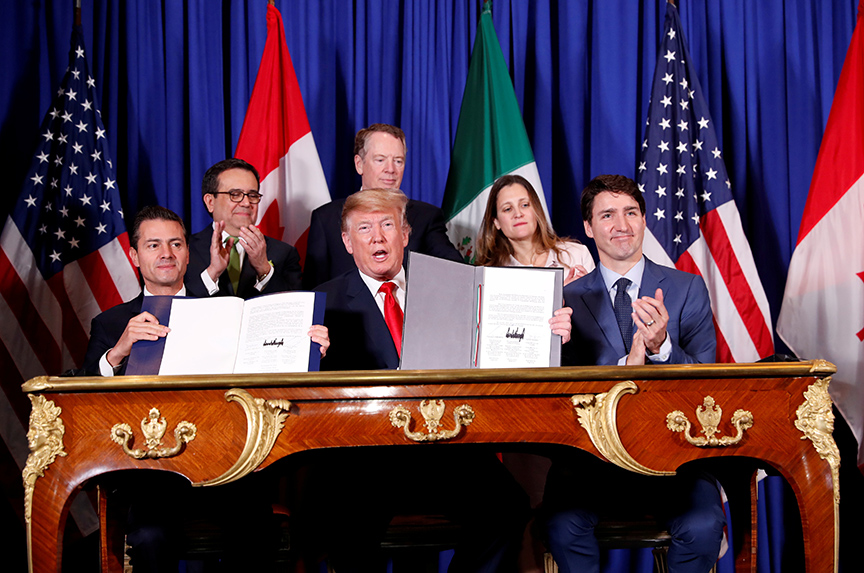
US President Donald J. Trump (center), Canadian Prime Minister Justin Trudeau (right), and Mexican President Enrique Peña Nieto signed the USMCA trade agreement before the start of the G20 Leaders’ Summit in Buenos Aires, Argentina, on November 30. They were accompanied by (back from left) Mexican Economy Minister Ildefonso Guajardo, US Trade Representative Robert Lighthizer, and Canadian Foreign Minister Chrystia Freeland. (Reuters/Kevin Lamarque)
December 1, 2018
US-China Trade War Truce: Trump and Chinese President Xi Jinping declare a truce in a tit-for-tat trade war. The two leaders agree to put on hold tariff increases for ninety days.
“There is no doubt that China’s mercantilist behavior, lack of reciprocity, and unabashed theft of intellectual property pose a significant challenge to the United States that must be addressed,” Jamie Metzl, a nonresident senior fellow for technology and national security in the Atlantic Council’s Scowcroft Center for Strategy and Security, told us.
“It is less clear whether the Trump administration’s go-it-alone strategy for responding to this Chinese challenge will be enough to turn the tide,” he added.
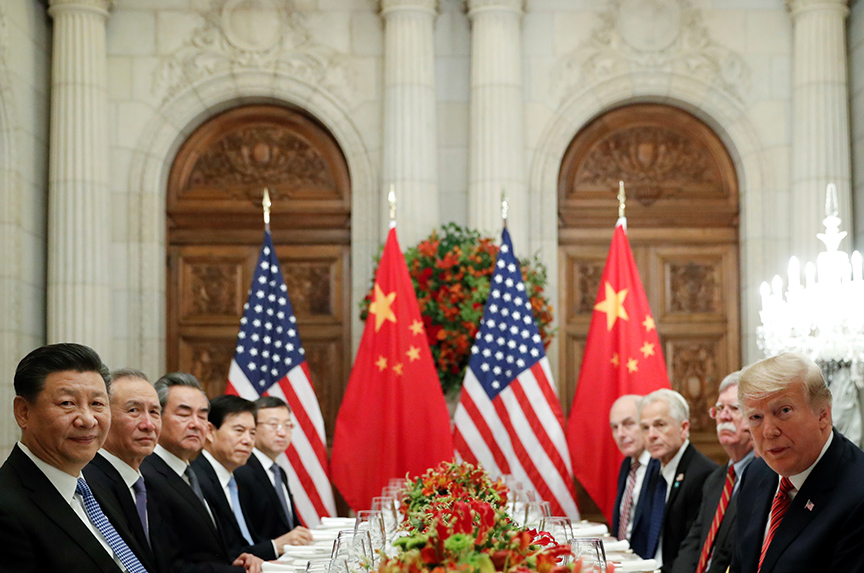
US President Donald J. Trump and Chinese President Xi Jinping attended a working dinner after the G20 Leaders’ Summit in Buenos Aires, Argentina, on December 1. (Reuters/Kevin Lamarque)
December 19, 2018
Syria Withdrawal: Against the counsel of some of his military advisers, Trump declares ISIS defeated and announces his decision to withdraw all US troops from Syria. The controversial announcement sparked a backlash, including from Trump’s allies like US Sen. Lindsey Graham (R-SC). The withdrawal plan now appears to be up in the air.
December 20, 2018
Mattis Resigns: US Defense Secretary James Mattis resigns citing policy differences with Trump. The New York Times reports Mattis resigned after failing to convince the president not to pull US troops from Syria.
Mattis’ departure “removes the strongest Cabinet voice against dismantling the US-led post-World War II international order,” wrote Todd Rosenblum, a nonresident senior fellow in the Atlantic Council’s Scowcroft Center for Strategy and Security.
Faysal Itani, a senior fellow with the Atlantic Council’s Rafik Hariri Center for the Middle East, said: “Losing Mattis removes one of the last establishment barriers to President Trump’s foreign policy tendencies.”
Mattis said he would leave the administration at the end of February. He is, however, asked to leave sooner.
Ashish Kumar Sen is deputy director of communications, editorial, at the Atlantic Council. Follow him on Twitter @AshishSen.
Image: US President Donald J. Trump walked to Marine One as he departed for campaign travel to North Carolina from the White House in Washington on October 22, 2018. (Reuters/Carlos Barria)
